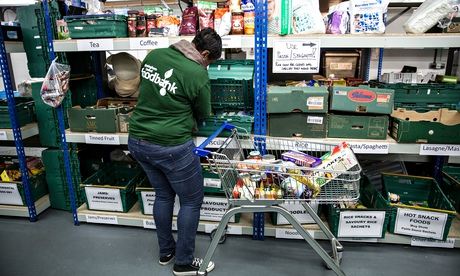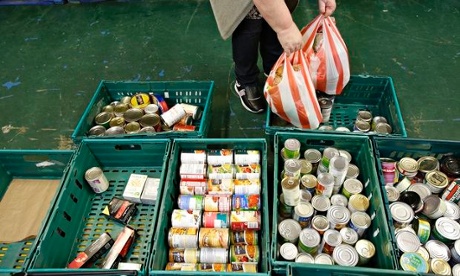Britain’s biggest food bank network has warned that reliance on charity food is in danger of becoming “the new normal” for low-income families in financial crisis.
The Trussell Trust, which oversees 424 food banks in the UK, said it gave out enough emergency food to feed more than 1.1 million people in 2015-16, a slight increase on the previous year.
The main reported reasons for food bank use were problems with the welfare system, such as slow processing and payment of benefits, and benefit changes including sanctions. Together they accounted for 42% of all referrals.
Nearly a fifth of all referrals were triggered by low income, a category that includes working people in low-paid, insecure employment and facing high living costs.
The Trussell figures have remained relatively stable for three years despite a general upswing in the UK economy. The trust said its figures did not reflect the scale of food insecurity in the UK. It estimates that the Trussell network accounts for half the total number of food bank-style projects in Britain.
The trust’s chief executive, David McAuley, said: “One million three-day food supplies given out by our food banks every year is one million too many. This must not become the new normal.”
He said that if hunger in the UK was to be tackled, the government needed to urgently address problems and delays in the benefits system.
However, a government spokesman said it was misleading to link food bank use to the benefits system. He claimed that the vast majority of benefits were processed on time and there had been a decline in the number of benefit sanctions.
He added: “This government is determined to move to a higher-wage society, introducing the new national living wage that will benefit over 1 million workers directly this year, and we’re also spending £80bn on working-age benefits to ensure a strong safety net for those who need it most.”
Government figures published this week at the request of the Labour MP Frank Field revealed that 154,309 people waited more than 10 days for their jobseeker’s allowance claim to be processed between March 2015 and February 2016. Of this group, 44,014 waited more than 16 days.
Field said: “If the Department for Work and Pensions could deliver all new claims more swiftly within five working days it would immediately reduce by a third the numbers of people needing to rely on food banks.”
Food bank use was highest in areas of high deprivation, especially areas with high concentrations of people unable to work because of disability or poor health, and areas with higher numbers of people in manual skilled work, according to research carried out by the Trussell Trust with the University of Hull.
Kerry McCarthy, the shadow secretary for the environment, food and rural affairs, said the rise in food bank use was a national scandal.
“Food banks have become a truly shameful symbol of a Tory government that is failing to stand up for ordinary people. While those at the top are given tax breaks, others are struggling to get by,” she said. “Emergency food aid should remain just that. Food banks can never be allowed to become a permanent feature of British society.”
Rachael Orr, Oxfam’s head of UK programmes, said the figures showed Britain’s poorest people had failed to benefit from the economic recovery. “Food banks are becoming a permanent fixture as poor people are forced to rely on the charity of others to get by and put food on the table,” Orr said.
The Trussell Trust said more than 40,000 volunteers had helped at its food banks last year, and the public donated 10,570 tonnes of food. Its clients were referred by more than 30,000 frontline professionals including social workers, welfare advisers and GPs.











